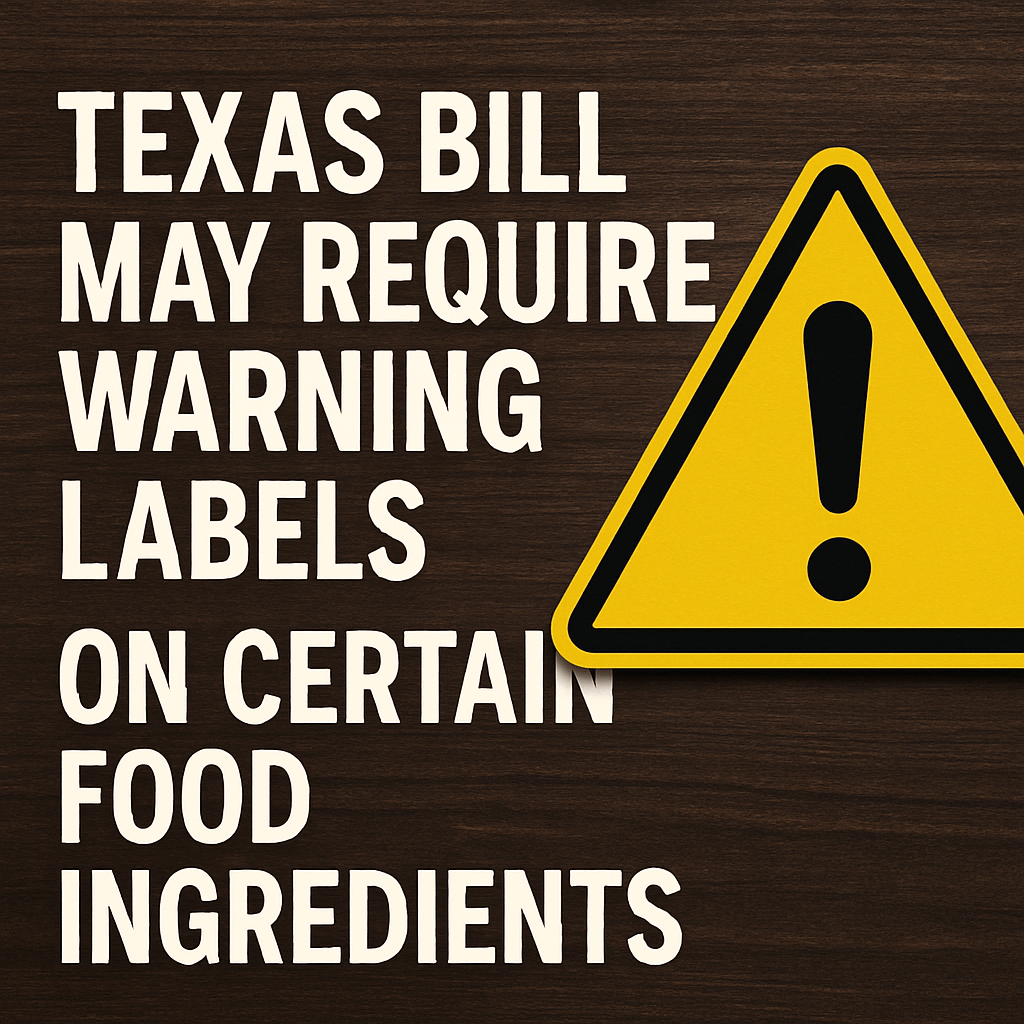Texas Bill May Require Warning Labels on Certain Food Ingredients

Texas Governor Greg Abbott is facing a pivotal decision regarding a bill that requires food manufacturers to affix warning labels on products containing ingredients recognized as harmful by other countries. This legislation, known as Senate Bill 25, has sparked a vigorous debate among health advocates, food manufacturers, and regulators.
Overview of Senate Bill 25
Senate Bill 25 mandates that food manufacturers in the U.S. label their products with warnings about certain ingredients deemed ‘not recommended for human consumption’ in other nations, particularly those with stricter food safety guidelines. The bill, set for implementation in 2027, requires that products containing substances like synthetic food dyes, bleached flour, and various additives that have been banned or restricted overseas display conspicuous warnings. For example, products from companies like PepsiCo, known for their brands such as Doritos and Mountain Dew, as well as General Mills with its Pillsbury Toaster Strudels, could be affected under this regulation.
Contextualizing the Legislation
Advocates such as Health and Human Services Secretary Robert F. Kennedy Jr. have rallied behind the bill, arguing that it is essential to address public health concerns related to artificial ingredients.
- Many countries enforce stringent regulations prohibiting synthetic dyes due to potential links to health issues, including hyperactivity in children and carcinogenic risks.
- Kennedy’s campaign, “Make America Healthy Again,” emphasizes transparency in food labeling and seeks to educate consumers about the implications of certain food additives.
The Impact of the Bill
If enacted, the bill signals a substantial shift in Texas’s regulatory approach—in a state historically characterized by minimal governmental intervention in business practices. As of 2024, Texas remains the second-largest state in the U.S. by population, with more than 31 million residents, indicating the law would have significant ramifications for the food industry.
Potential Economic Repercussions
Opposition to the bill comes from major food manufacturers, who argue that this legislation could create economic instability. In a letter dated May 19, numerous food industry stakeholders urged the Texas legislature to remove the warning label clause, asserting that it would:
- Generate consumer confusion due to inconsistent standards compared to regulations established by the U.S. FDA.
- Instigate a legal quagmire for brands, exposing them to potential lawsuits based on the ambiguous language of the warning requirements.
- Constrain access to popular food items at a time when economic uncertainty looms over consumer purchasing behaviors.
Legal and Regulatory Challenges
Experts suggest that the invocation of foreign food standards creates a legal minefield for manufacturers. Jura Liaukonyte, a professor from Cornell University, remarks that this bill could highlight disparities between U.S. and international food safety systems, such as the European Union’s precautionary principle, which mandates extensive pre-market testing for food additives.
In the U.S., food manufacturers often utilize the ‘Generally Recognized As Safe’ (GRAS) threshold, allowing certain ingredients to bypass FDA scrutiny if experts deem their safety based on historical use and research. Kennedy’s call for revisiting the GRAS framework aligns with ongoing discussions around food safety legislation, with several states, including New York, considering additional restrictions on GRAS claims.
Broader Implications for Food Safety and Health Policy
This legislative moment creates an opportunity for a reevaluation of food labeling standards nationwide. As the focus shifts toward health-oriented policies, there is a growing argument for extending these standards to cover other dietary concerns—including sugar, salt, and unhealthy fats. Public health experts argue for a multifaceted approach, combining consumer education with clear legislative frameworks that support healthier eating behaviors.
Christina Roberto from the University of Pennsylvania underscores the importance of coupling these labeling initiatives with broader regulations, advocating for a comprehensive strategy that prioritizes children’s health over mere market convenience.
Conclusion
The decision on Senate Bill 25 by Governor Abbott could mark a transformational moment for food regulation in Texas and potentially set precedents influencing national standards. As stakeholders continue to voice their concerns and support, Texas’s approach to food safety could inspire similar legislative movements across the United States.
Introducing the 2025 Fortune 500
Stay updated with the latest insights on the biggest companies in America. Explore this year’s list.
About the Author:
Sasha Rogelberg is a reporter and former editorial fellow at Fortune, focusing on retail and the intersection of business and popular culture.